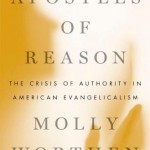 In chapter 5 (“The Marks of Campus Conversion”) of her recently released book Apostles of Reason: The Crisis of Authority in American Evangelicalism
In chapter 5 (“The Marks of Campus Conversion”) of her recently released book Apostles of Reason: The Crisis of Authority in American Evangelicalism (Oxford University Press), Molly Worthen looks at the founding of faith-based colleges in the early decades of evangelicalism, and the resulting uneasy relationship between the evangelical quest for academic respectability and the academic freedom that is normally considered part and parcel of that quest. (All italics below are mine.)
“The one thing most crucial to professional higher education was the one thing that most stymied conservative Protestant educators: academic freedom. Behind their hand-wringing over the liberal arts [vs. a Bible-based education] and their resentment of meddling accreditors was the fear that these reforms would encourage teachers and students to prize intellectual exploration over evangelism and prefer the scientific method to proof texts. They would ask questions–and venture answers–that might place their salvation at risk” (p. 109).
“The inductive method [in general and particularly of Bible study] appeared to repair the fracture between faith and reason. It restored the Bible to its rightful authority while assimilating–yet restraining–human rationalism. Over the years, conservative Protestants would use it to hold at bay a range of ideas, condemning everything from Darwin’s evolution to inborn homosexual orientation as mere ‘theories,’ speculative hypotheses without basis in inductive study of facts. By this standard, academic freedom as understood in the modern secular university–the liberty to follow scientific observation to its conclusions even if those conclusions flout received wisdom, and the liberty to answer to no other authority than one’s colleagues–was not freedom at all, but slavery to human pride that would lead young Christians from the narrow path” (p. 110)
“Yet Christian colleges could not win the approval of secular accrediting bodies without raising faculty salaries…, standardizing tenure, and codifying operating procedures in a way that checked executive power and gave the faculty some voice and opportunity for professional development. Capricious tenure policies and unfair dismissal sometimes continued, but now that their schools were part of interstate associations that included public, Roman Catholic, and mainline Protestant colleges and universities, faculty began to think of themselves as professional scholars responsible not only to their college and church, but to a community of intellectual peers …[which led to the formation of various evangelical academic societies for those seeking] to balance standards of professional scholarship with the demands of faith….Through the 1950s and 1960s, however, many of the most talented evangelical scholars spent their careers at Christian colleges that did not encourage them to think of themselves as citizens of a broader intellectual community” (p. 111).














